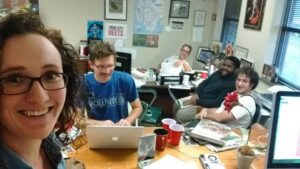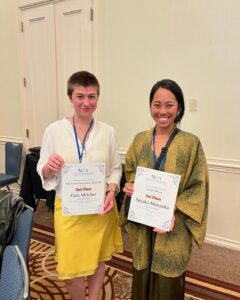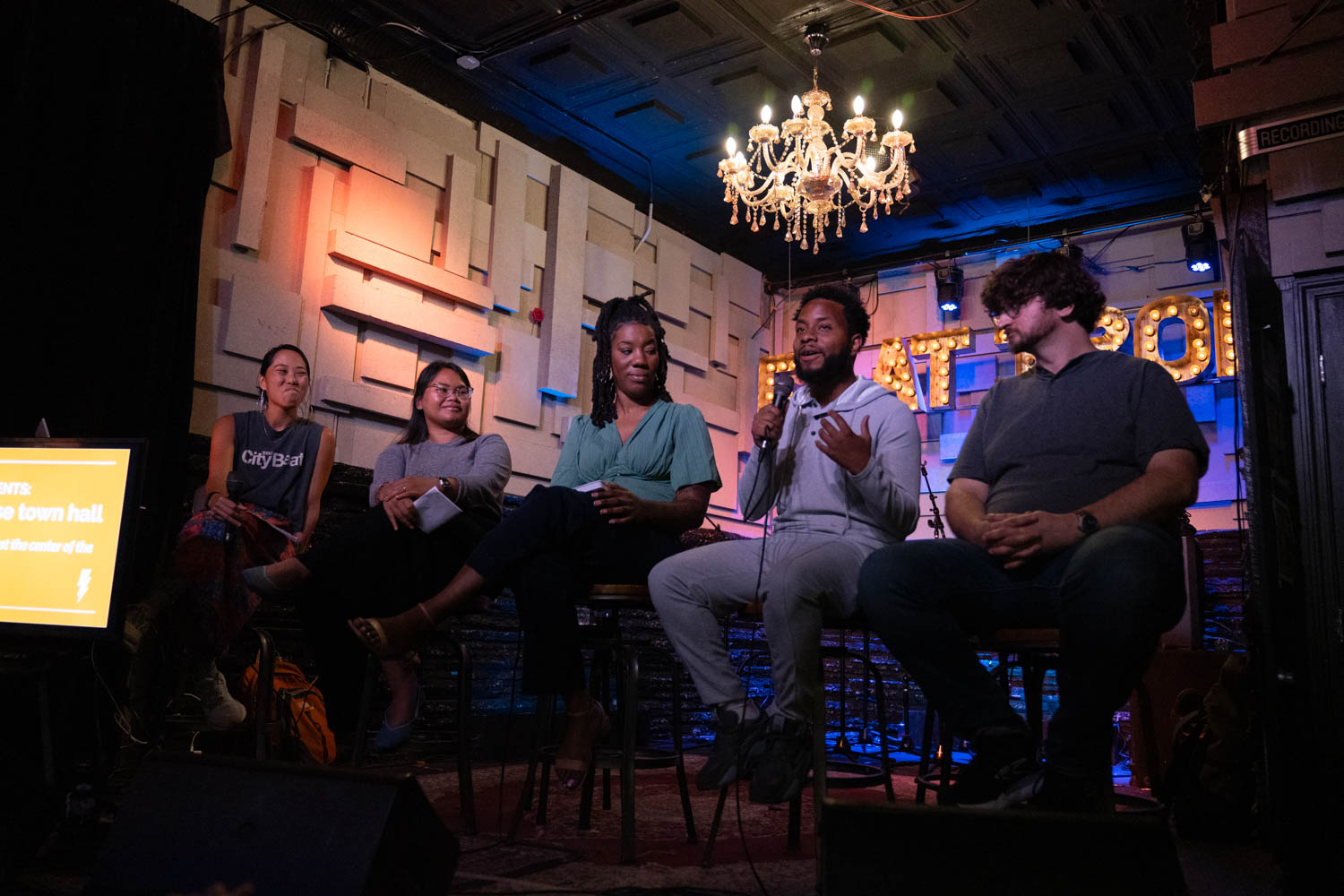By Catherine Komp, Engagement Director
When Triad City Beat announced late last month that the time had come to shut down, readers weighed in on the role this scrappy news outlet played in the community:
This is very sad news especially at this political moment.
Please figure out how to continue reporting local news.
I have appreciated y’all’s integrity and willingness to hear feedback.
A huge loss to local news reporting.
Your presence made a difference.
You guys definitely made an impact.
Damnit
Damn
Born out of spite after co-founder Brian Clarey was let go from another publication, TCB spent the last decade providing Greensboro, Winston-Salem and High Point with coverage of local government, stories that highlighted solutions, and pieces that amplified marginalized voices. They first covered “Black Lives Matter” back in 2014, created a guide to resist facism in 2016 and adapted to the dramatic changes brought by COVID and the 2020 racial justice movement, bringing the community live streams of rallies and daily updates about the pandemic. All throughout, they also celebrated local arts, culture and what makes the Triad unique, from an illustrated guide to local panaderías to mapping the work of “Bartsy” around town.
“I’m really proud that we were able to just do it at all,” said Clarey. “That we were able to stake our territory, that we were able to speak truth to power for the time that we did and train up so many folks to go on and do things in this industry.”

But the operation always ran on limited funds and after a devastating car crash last year that upended the lives of Brian and his family, things changed for him– physically, mentally and financially. Mounting medical bills meant he needed a job with more stability. Coming so close to death, brought new perspectives about the day-to-day stress of running a small, local news business on a shoestring.
“I’ve done thousands of stories and written so many words about so many things, and had so many great experiences… things that I’ll never forget, that front row seat to history,” said Clarey. “That part of my career was amazing and I choose to look on it fondly and warmly, as opposed to regretfully.”
For Sayaka Matsuoka, it’s bittersweet but she also has no regrets. She first joined TCB as an intern after the paper first launched. After a few years in Chapel Hill, she returned to Greensboro and TCB, eventually taking on the role of managing editor. She says TCB’s ethos of not adhering to the myth of objectivity, of calling out racism and bigotry, comes from a long tradition of movement journalists and organizers before them.
“Anywhere you look in your community, there are going to be people who are pushing back against the atrocities of the world, injustices big and small. So I’m heartened by that. That’s actually the thing that allows me to do this work. If I didn’t feel like there was some semblance of hope and resistance at all times, it would be impossible to do this job,” said Matsuoka.
As TCB prepares to sunset, we had the opportunity to chat with Brian and Sayaka about the role they’ve played in the local news ecosystem, lessons learned from a decade of publishing, and what’s kept them going all these years.
Triad City Beat’s last print edition is February 20th. Ahead of that, you can send in messages they may print in the paper. There will be a celebration of TCB, the staff, contributors, readers and supporters on Friday February 28, from 6-9 pm, at Scuppernong Books.
NC Local: Could you both share a few words that describe how you’re feeling as you think about Triad City Beat sunsetting after 10+ years of publishing?

Sayaka Matsuoka: It’s bittersweet for me. This is where I started my journalism career over 10 years ago. I didn’t come from a traditional background in journalism, so I didn’t go to school for it. I went to school for art history at UNCG and I just graduated from there and was trying to figure out what I was going to do next when I came across Triad City Beat’s internship program. Of course Triad City Beat had only been operational for a few months at that point. So I was sort of here, not at the very beginning, but pretty early on. And I got to see the inner workings of the newsroom back when it was Brian (Clarey), Jordan (Green) and Eric (Ginsburg). And over the last I would say maybe 6 1/2 years of me being back in Greensboro after having moved away, I think we’ve continued on that tradition of muckraking and really important journalism. So I’m sad to see the institution itself close, but we’re hoping that we can keep the reporting capacity local. So it’s bittersweet. I’m really proud of all the work that we’ve done. I have no regrets. So I’m looking back on my time here with fondness and the last 11 years of this paper as a whole with fondness and gratitude, really.
Brian Clarey: It’s a mixed bag. It was possibly the hardest thing I’ve ever undertaken. It was so much work, it was so much stress, it was such steep learning. I had virtually no business training at all before I started this business. And it was just so much. We were always underfunded. We were always punching above our weight class. We always felt like we had something to prove. Professionally, yeah we didn’t really make any money, but it was a successful venture because we were able to nudge the Overton window just a little bit in the city of Greensboro. We were able to do a lot of stories that wouldn’t have gotten done had we not picked them up or might have gotten done in a different way had we not been on the scene.
We launched so many great careers. So many people went on to bigger and better things, including Sayaka. Sayaka, I’m so proud of you. I have to tell you, I was thinking about that day you came into the office and I first met you, and it was a lifetime ago. And it was an important thing for a long time.
Personally, I’m kind of out of the journalism game now, but I’ve had a long career. I started in 1994 with The Gambit in New Orleans, and I’ve done thousands of stories and written so many words about so many things, and had so many great experiences. A lot of them came through my work with Triad City Beat, things that I’ll never forget, that front row seat to history. So my journalism itch has been scratched. I’ve been able to do a lot of work that has gotten published, on so many different subjects and meet so many people. That part of my career was amazing and I choose to look on it fondly and warmly, as opposed to regretfully.
NC Local: You talk about shifting the Overton window and in the interview you did with Eric Frederick for NC Local back in March 2023 you said you’re “not doing the view from nowhere.” And TCB did that so often, covering efforts to call out racism and hate, policies attacking people’s sense of dignity, explaining problems with official narratives following police shootings. What might be the impact from the absence of this “view from somewhere”?
Brian Clarey: I have some thoughts about this. What comes next in anything is always built on things that came before it. So we were able to stake this territory in this place and hopefully whatever comes after us builds upon that and that becomes part of the overall DNA of what happens next. Young folks who started reading Triad City Beat when they were maybe in high school or in college, understand that that’s something you’re able to do in journalism as opposed to both sides-ism or that view from nowhere. That you can have a moral base to your work. And you don’t have to swallow whole the stuff they’re trying to spoon feed you. I’m hoping that that influence will last.
Sayaka Matsuoka: I think it is a scary time to lose any local news organization, especially with everything going on in national politics. But, kind of like the thing that became a meme last year with Kamala Harris, the sentiment of you think you just fell out of a coconut tree, right? This newspaper, we didn’t invent these things. We didn’t invent these traditions of movement journalism, of the idea of not adhering to the myth of objectivity. Our ideology and viewpoints are on the backs of other journalists and organizers and thinkers who came before us. And I like to think that we were sort of a megaphone for some of those thinkers and ideologies and viewpoints. And those viewpoints are still around. Anywhere you look in your community, there are going to be people who are pushing back against the atrocities of the world, injustices big and small. So I’m heartened by that. That’s actually the thing that allows me to do this work. If I didn’t feel like there was some semblance of hope and resistance at all times, it would be impossible to do this job. And, as much as there is to despair about the world, those are the things that I sort of cling to. For example, the Day without Immigrants protests that have happened just in these last few days. There was a huge protest in Greensboro, which TCB live streamed. We had nothing to do with that event, we just showcased it and said that it was happening, but there are people who are doing things like that all the time. We are storytellers, not necessarily story makers. So, I think just finding those people and uplifting them and telling their stories is something that we can all do and it doesn’t necessarily have to be through a local news outlet.
NC Local: Last year, you had that 10 year anniversary edition that highlighted a lot of impactful coverage over the years. But I still wanted to give you the opportunity to talk about what you’re really proud of throughout the course of TCB and especially over the last year, you did some really innovative things.
Sayaka Matsuoka: So we’ve been around since 2014 and of course we’ve done a lot of great work, a lot of that great was also done by Jordan Green, who was a cofounder and did a lot of local, right wing extremism reporting back when it wasn’t necessarily as national or mainstream.

But you know 2020, I think was a really big moment for us and I think a moment in which we gained a lot of visibility. We live streamed a lot of the Black Lives Matter protests here and then in conjunction with that we did a lot of reporting about the pandemic. Brian did a daily pandemic update, sort of a diary on the website. So 2020 was a huge year institutionally for us. And then since the beginning of this paper, I think we’ve always taken ownership of local election coverage. We’ve always had an election guide. We’ve never done endorsements and so anything from soil and water all the way up to the presidential, we would do reporting on those races and then in the last year as sort of like a spin off of that, we did for the first time these reverse town halls, which I’m personally proud of. Again, that’s not our idea. Completely stolen from a news outlet out of Louisiana and I had a conversation with their editor about how they did it. And so we did two similar events here. So those are the things I’m probably the most proud of.
Brian Clarey: As for me, I’ve done a lot of talking about the stories and stuff over the years that we’ve covered, that I’m proud of. But today, I’m thinking about all the people who have passed through Triad City Beat, and the effect they’ve had on me and how proud I am of all of them, especially Sayaka. Oh my God, you’re awesome. You know Eric Ginsburg and Jordan and Michaela Ratliff, who is working at Fox 8 now. And the folks that we taught how to report the news or how to write features or how to make pitches or how to go on to a freelance career afterwards. There’s been a couple of dozen folks who have come through and so many of them are still in or adjacent to this industry. And it’s really hard to break into this industry. It was hard for me to break into this industry. I like that we’ve been able to sort of hold the door open to let some others in.
I’m also just proud that we did it at all. You know, this started because I got fired. Spite and resentment was the fuel that kept us going in the early days. But if you look at how many media outlets were started by laid off journalists. There was a whole movement of that around 2010, 2015 or even before. Not too many of them made it 11 years and I’m really proud that we were able to just do it all. And then we were able to stake our territory, that we were able to speak truth to power for the time that we did and train up so many folks to go on and do things in this industry.
NC Local: You clearly evolved in a lot of ways over the years, doing a lot of convening, doing live streams. You had to figure out newsletters and digital as print circulation changed. Could you share a bit about lessons learned from the business side of things?
Brian Clarey: It’s hard. I’ll say that. I’m old, man. And I come from a print background and it took me a long time to learn how to make an actual newspaper and what that process was like. I remember when I was at Yes Weekly we had some discussion as to whether we should have a website or not. I was very forward thinking, I felt that we should have a website. But back when I started at the gambit in New Orleans, we wrote our stories and they existed on the streets for a week and then they were gone forever. The Internet wasn’t new, but it was really just starting to become a part of our everyday operations. I remember when I finally figured out how to place ads on the website. I felt like a fricking genius that opened up a whole new revenue stream. When I started, in Quickbooks, there was a little button that says taxes and I was like, “oh, I wonder what this is.” Then I realized we have to pay payroll taxes, an additional contribution from the company besides what the employees get scraped out of their checks. And I remember when in the very beginning we got so much traffic like 86% or something, from Facebook. And then Facebook changed their algorithm for business pages, where only the top 5% of the people who’ve liked your page would see your posts. And of that 5%, half of them worked for us so nothing was getting out. And that’s how I learned about SEO and how to make sure your website is actually connected to the internet in those other ways.
And plugging into the statewide network of journalism and the content producers, which I guess is what we’re called now and finding that fellowship and those sorts of collaborations and the sorts of training that I’ve been able to get. Table Stakes and a lot of other formal and informal sessions that I’ve had. The connections I’ve made with other papers and other publishers and editors and journalists throughout the state, has been mighty. But as far as business, it was never my dream to have a paper of my own. This just happened because it had to happen and it felt inevitable in the beginning just as now it feels inevitable that I that I’m out.
Sayaka Matsuoka: We started doing newsletters. Back in 2020, when the trend of non profit newsrooms was really starting to take off, I pushed Brian to see if that was something that would make sense for TCB and through that we ended up getting a fiscal sponsor through the Ann Foundation, which is how we got our initial grant to hire Gail, who is our city beat reporter. I think we did expand and learn some things in terms of the business side by expanding in that way. I was more focused on the editorial side and trying to shore that up and make sure that that was sort of robust and interesting so that it would translate over to the business side.
Brian Clarey: That nonprofit piece was big for us and I did start to look into what it would take to convert to a non profit. But at the same time we were starting to get some grants through COVID which led to another big business lesson, which is the difference between funding and revenue, which are not the same thing. And you need both. The fact of it is that all of us for profits are working under a broken business model. And broken might not be the right word because it implies that it can be fixed, but none of us are ever going to sell enough advertising to do what needs to be done. Those days are gone. Where it was once you know, newspapers enjoyed a monopoly or a near monopoly, a massive profit margin, incredible saturation, large audiences, an authority and trust. It’s changed and it’s not going back.
NC Local: We’re seeing the growth of journalism support organizations which are expanding with philanthropic funding. From your experiences, do you have suggestions for areas where they could provide more support with business models and sustainability?
Brian Clarey: Local philanthropic organizations need to get in the game if they’re not already. They need to recognize that their communities, not just because they work there, they have to live there too. And you know you want someone covering the school board, for God’s sake, you need somebody looking at the County Commission. Even just these basic functions of journalism, of local news aren’t getting met in so many markets across the state. And ours is the third largest in the state and I’m here to tell you right now that nobody is covering the school board with any regularity. Someone’s got to pick up the tab for that, because it’s not going to be local businesses because they’re not going to do it. And larger businesses like Walmart, they’re never going to advertise with us and drove a lot of people who would have out of business. So the local philanthropic organizations need to get in the game locally in their communities because we know what happens when these government entities don’t get the scrutiny they need.
NC Local: I’m curious about your archives. Are you on DigitalNC? Are you planning to keep the website up? You have such a trove of important work and documentation about the community.
Brian Clarey: We have a meeting about that soon. I’ve worked for papers that disappeared their own archives. A huge chunk of my own journalism between 2005 and 2013 is gone. All that work and all of my colleagues work is gone. Some of that was just so important. It was the truth and reconciliation in Greensboro and stuff that we want to have just for our own reference. But I’ve got a couple of plans. One of the things that we’ve always been able to do is keep costs down so we self host on a private server that, if I have to pay for myself to keep it going, I will. Or we can bundle it as an asset if someone else wants the content. We’re not on DigitalNC, but we’ve had some conversations with groups along those lines to see if they want to host it. But I agree, it’s really important. It almost seems immoral to to disappear these first drafts of history.
NC Local: Any plans to preserve your newspaper boxes as a monument to TCB? You have that iconic photo of one, I think during COVID, when the streets were empty.
Brian Clarey: I know Sayaka wants at least one.
Sayaka Matsuoka: I want to keep one. I’m probably just going to snag one off the streets (laughs).
Brian Clarey: I have one outside my TCB office, a former Daily Tar Heel double box. In the beginning, we gave a bunch of boxes to local artists and let them do what they wanted with them. Those are all out on the streets somewhere. The one by Patrick Harris, probably my favorite local artist, is the one in my office. The others? I guess I gotta go collect them all at some point or bundle them up as an asset and if someone can use them. Baltimore Beat is doing such cool things with their boxes. I wish we’d thought of that. They’re making them into free food pantries as well, I love that idea.
NC Local: To close up, what can people expect at the “Last Anniversary” party and is there anything else you’d like to share?
Brian Clarey: I hope we’ll have an announcement about the future at the anniversary party, but it’s not a funeral, it’s a celebration. We had a damn good run. We did the best we could and we’re glad we did it. So we’re all just going to get together and celebrate that. I’m hoping to see some faces from the past, I’m hoping to see some readers. I’m hoping to see some of the folks who helped us along the way. And, you know, it’s a party.
Sayaka Matsuoka: It’s meant to be a celebration. We don’t regret anything that we’ve done or accomplished in the last 10 years. By next month, at the end of the month, it’ll be 11 years. So we’re really just looking back on this project, this entity with fondness and gratitude. Ideally we will have more news about where people can continue to find Gale Melcher and my reporting by then. And we will have had our final issue, which comes out on February 20th, out for about a week by then. For folks who have ever supported Triad City Beat or want to leave a note, I’m calling it “writing in TCB’s final yearbook,” we are taking messages and if we like your message and we have enough space, we might run it in print. There’s a way to contribute to that on our website. So yeah, just hoping people keep an eye out for that last issue and that they come join us for the party.




